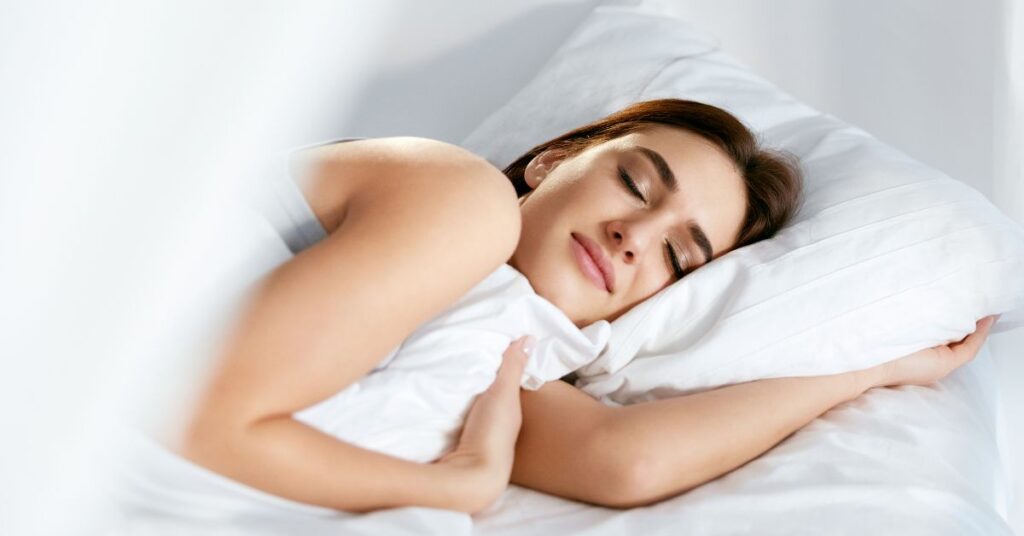Biohacking sleep isn’t just a buzzword—it’s a science-backed strategy to transform your rest, boost your health, and extend your life. Imagine waking up refreshed, your mind sharp, your body energized, and your mood lifted, all because you’ve mastered the art of sleep. Poor sleep doesn’t just leave you groggy; it chips away at your longevity sleep, increasing risks of chronic diseases and even shortening your sleep life expectancy. In this guide, we’ll explore seven cutting-edge ways to biohack sleep, helping you improve deep sleep and live longer, healthier, and happier.
Why Sleep Is Your Longevity Superpower
Sleep is the foundation of health, yet millions struggle to get healthy sleep hours (7–9 hours for most adults). Research shows that chronic sleep deprivation is linked to obesity, diabetes, heart disease, and a weakened immune system. For those with untreated sleep apnea, the life expectancy of sleep apnea can be reduced by up to 15 years due to cardiovascular strain and oxygen deprivation. A sleep life expectancy graph would starkly illustrate this: as sleep quality and duration decline, mortality risk rises exponentially.
But here’s the good news: by biohacking sleep, you can reverse these risks and unlock restorative rest. Biohacking involves using science, technology, and lifestyle tweaks to optimize your body’s natural processes. When applied to sleep, it means enhancing melatonin production, boosting deep sleep, and aligning with your circadian rhythm for longevity sleep. Let’s dive into seven proven strategies to biohack sleep and transform your nights.
1. Sync Your Circadian Rhythm with Light and Timing
Your circadian rhythm, the body’s 24-hour clock, governs when you feel awake or sleepy. To biohack sleep, align your daily habits with this rhythm:
- Morning Sunlight Exposure: Get 15–30 minutes of natural light within an hour of waking. This boosts serotonin, which later converts to melatonin, helping you induce a deep sleep at night.
- Consistent Sleep Schedule: Go to bed and wake up at the same time daily, even on weekends. This stabilizes your circadian rhythm, ensuring healthy sleep hours.
- Evening Light Management: Avoid blue light from screens 2 hours before bed, as it suppresses melatonin. Use blue-light-blocking glasses or apps like f.lux to improve deep sleep.
Pro Tip: Consider a sunrise alarm clock to mimic natural light transitions, reinforcing your circadian rhythm for longevity sleep.
2. Optimize Your Sleep Sanctuary
Your bedroom is more than a place to crash—it’s a biohacking tool. A sleep-friendly environment signals your brain to relax and promotes deep sleep:
- Cool Temperature: Keep your room between 60–67°F (16–19°C). A cooler body temperature helps induce a deep sleep by mimicking the natural drop during sleep cycles.
- Darkness and Silence: Use blackout curtains and a white noise machine to eliminate light and sound disruptions. Even dim light can reduce melatonin by 50%, sabotaging healthy sleep hours.
- Comfortable Bedding: Invest in a cooling mattress (e.g., bamboo or gel-infused) and breathable sheets. A supportive pillow can also prevent neck strain, enhancing longevity sleep.
Pro Tip: Try a weighted blanket (10% of your body weight) to reduce anxiety and promote relaxation, helping you biohack sleep effortlessly.
3. Hack Your Diet for Better Sleep
What you eat—and when—directly impacts your ability to improve deep sleep. Here’s how to biohack sleep through nutrition:
- Eat Early: Finish your last meal 3–4 hours before bed to allow digestion to complete. Late meals keep your body in “active” mode, disrupting deep sleep.
- Sleep-Boosting Foods: Incorporate magnesium-rich foods (spinach, almonds) and tryptophan-rich foods (turkey, bananas) to support melatonin production and induce a deep sleep.
- Limit Stimulants: Avoid caffeine after 2 p.m. and minimize alcohol, which fragments REM sleep and reduces healthy sleep hours.
Pro Tip: Sip chamomile tea or tart cherry juice (a natural melatonin source) 45 minutes before bed to enhance longevity sleep.
4. Leverage Sleep Tracking for Precision Biohacking
Wearable devices like Oura Ring, Fitbit, or Whoop provide data to biohack sleep with precision. Here’s what to track and how to act on it:
- Sleep Stages: Aim for 20–25% of your sleep in deep sleep (Stage 3 non-REM) and 20–25% in REM. If deep sleep is low, prioritize stress reduction and cooling your room.
- Heart Rate Variability (HRV): Higher HRV indicates better recovery and sleep quality. Low HRV? Try meditation or yoga to improve deep sleep.
- Oxygen Saturation: Drops in oxygen levels may signal sleep apnea, which can drastically reduce the life expectancy of sleep apnea. Consult a doctor if levels dip below 90%.
Pro Tip: Use sleep tracker insights to experiment with biohacking techniques, like adjusting bedtime or trying supplements, to optimize healthy sleep hours.
5. Master Pre-Sleep Rituals for Relaxation
A calming pre-sleep routine prepares your body and mind to induce a deep sleep. Tailor these rituals to your lifestyle:
- Meditation or Breathwork: Practice 10 minutes of box breathing (4-second inhale, hold, exhale, hold) to activate the parasympathetic nervous system and improve deep sleep.
- Aromatherapy: Diffuse lavender or cedarwood essential oils 30 minutes before bed. Studies show lavender boosts melatonin, enhancing longevity sleep.
- Journaling: Write down tomorrow’s tasks to clear your mind, reducing anxiety that disrupts healthy sleep hours.
Pro Tip: For shift workers or night owls, adapt rituals to your schedule, using dim red lighting to mimic evening cues and biohack sleep effectively.
6. Explore Advanced Biohacking Tools
Cutting-edge technology can take your biohacking sleep efforts to the next level. Here are three tools to consider:
- Red Light Therapy: Exposure to low-level red light 30 minutes before bed boosts melatonin and reduces inflammation, helping you improve deep sleep. Devices like Joovv are popular among biohackers.
- Binaural Beats: Listen to delta-wave binaural beats (1–4 Hz) through headphones to entrain your brain for deep sleep. Apps like Brain.fm offer guided tracks.
- Smart Sleep Systems: Devices like Eight Sleep regulate bed temperature throughout the night, optimizing your body’s thermal rhythm for longevity sleep.
Pro Tip: Start with budget-friendly options, like free binaural beat apps, before investing in pricier tools to biohack sleep.
7. Personalize with Chronobiology and Supplementation
Your genetic makeup influences how you sleep. By understanding your chronotype and using targeted supplements, you can biohack sleep for maximum impact:
- Chronobiology Testing: A DNA test (e.g., 23andMe) can reveal if you’re a morning lark or night owl, allowing you to align your sleep schedule with your biology for healthy sleep hours.
- Supplements: Consider melatonin (1–3 mg) for jet lag or insomnia, magnesium glycinate (200–400 mg) for relaxation, or L-theanine (100–200 mg) to induce a deep sleep. Always consult a doctor first.
- Peptides: Emerging research suggests peptides like DSIP (Delta Sleep-Inducing Peptide) may enhance deep sleep, but they’re not widely available yet.
Pro Tip: Work with a functional medicine practitioner to tailor supplements to your needs, ensuring they support longevity sleep without side effects.
The Longevity Payoff: Why Biohacking Sleep Matters
By implementing these strategies, you’re not just improving your nights—you’re investing in your future. Optimized sleep reduces the risk of chronic diseases, sharpens cognitive function, and boosts emotional resilience. For those with sleep apnea, addressing it through biohacking or medical intervention can add years to your sleep life expectancy. A sleep life expectancy graph would show a clear trend: consistent healthy sleep hours correlate with a longer, healthier life.
Start small—pick one or two strategies, like syncing your circadian rhythm or optimizing your bedroom. Track your progress with a sleep device, and gradually layer in more biohacking techniques. Over time, you’ll improve deep sleep, feel more energized,biohack sleep, and unlock the full potential of longevity sleep.
FAQs About Biohacking Sleep
What is biohacking sleep?
Biohacking sleep involves using science, technology, and lifestyle changes to optimize sleep quality and duration, enhancing health and longevity sleep.
How can I improve deep sleep?
To improve deep sleep, cool your room, practice stress-reducing rituals like meditation, and consider supplements like magnesium to promote relaxation.
Does sleep apnea affect life expectancy?
Yes, untreated sleep apnea can reduce life expectancy of sleep apnea by up to 15 years due to heart strain and oxygen loss. Consult a doctor for diagnosis and treatment.
What are healthy sleep hours?
Most adults need 7–9 hours of sleep nightly to support healthy sleep hours and maximize longevity sleep.
Conclusion: Your Journey to Restful, Life-Extending Sleep
Biohacking sleep is more than a trend—it’s a lifestyle choice that empowers you to take control of your health. By syncing with your circadian rhythm, optimizing your environment, and exploring advanced tools, you can induce a deep sleep, achieve healthy sleep hours, and extend your sleep life expectancy. Start tonight, and wake up to a longer, healthier life.


